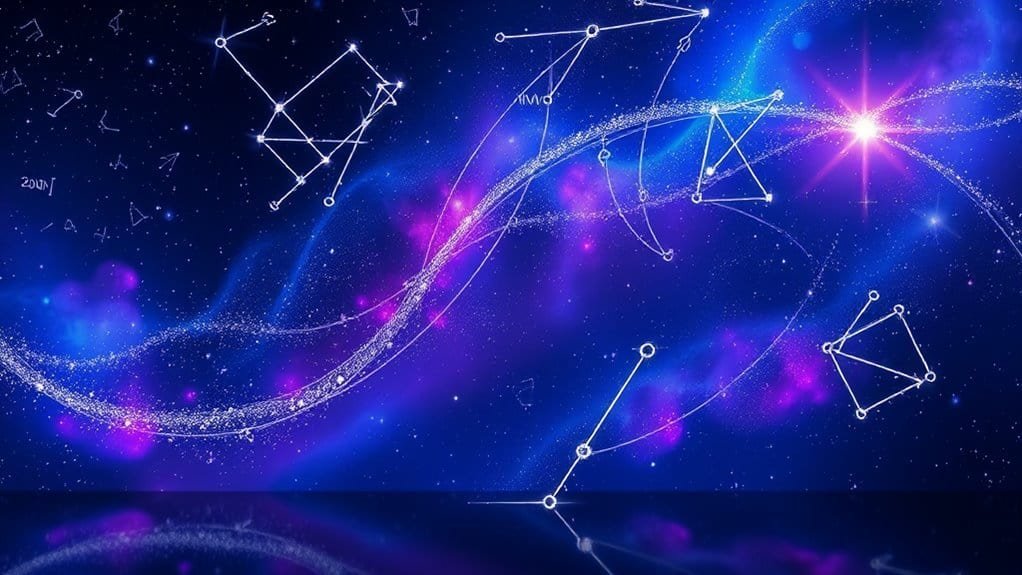Astrology & Mental Health: Planetary Effects

Astrology can influence mental health by showing how planetary movements affect emotions and behaviors. For instance, Mercury retrograde may cause communication issues, while a full moon might intensify feelings, prompting reflection.
Understanding your zodiac sign can enhance self-awareness and reveal traits impacting your mood. Embracing these insights can foster personal growth and emotional well-being, helping you navigate challenging times.
The Basics of Astrology and Mental Health

Exploring astrology’s connection to mental health can provide valuable insights into your emotional well-being. It offers a framework to understand your personality and behaviors, impacting your mental state.
By examining your birth chart, you can identify strengths and challenges to better navigate life’s ups and downs. For instance, your Sun sign reveals how you process emotions, while your Moon sign offers clues about your inner self.
This knowledge empowers informed choices, fostering personal growth and emotional stability.
How Planetary Movements Affect Emotions
Planetary movements can significantly impact your emotions and mental state.
For example, Mercury retrograde may cause communication issues and frustration, while a full moon can heighten emotions.
Eclipses might increase anxiety, Venus aligning with your sign can boost creativity, and Mars’ position may influence mood swings.
Understanding these shifts can aid in navigating your feelings and embracing growth opportunities.
The Role of Zodiac Signs in Psychological Traits

Planetary movements influence emotions and reveal the role of zodiac signs in psychological traits. Each sign has unique characteristics affecting thoughts and feelings.
For example, Aries is bold and impulsive, while Taurus is steady and reliable. Knowing your zodiac sign helps you understand your strengths and weaknesses, highlighting traits as part of a cosmic pattern.
Recognizing these patterns fosters self-awareness, enhances relationships, and aids in navigating daily challenges effectively.
Lunar Phases and Their Impact on Mood
Lunar phases, with their rhythmic cycles, influence our moods and emotional well-being, causing noticeable shifts in feelings.
Each phase brings unique energies:
- New Moon: Perfect for new beginnings and setting intentions.
- Full Moon: Amplifies emotions, ideal for reflection.
- Waning Crescent: Promotes releasing what no longer serves you.
Retrogrades and Their Psychological Implications

During planetary retrogrades, when planets seem to move backward, it feels like a cosmic pause, prompting reflection on choices and emotions.
Confusion or frustration, especially in communication and relationships, may arise, leading to introspection.
Use this time to reassess priorities; journaling can clarify feelings.
Retrogrades offer growth opportunities, not just obstacles.
Take a breath, slow down, and process what’s truly important.
Using Astrology for Personal Growth and Self-Reflection
Astrology serves as a valuable tool for personal growth and self-reflection.
By examining your birth chart and current transits with an open mind, you can uncover insights into your strengths and challenges.
Astrology helps identify recurring life patterns, clarify emotional responses, and set meaningful future intentions.
Exploring the symbolism of your astrological signs enriches self-awareness, guiding personal development and deepening your understanding of your unique journey.
Frequently Asked Questions
Can Astrology Predict Specific Mental Health Disorders?
You can’t rely on astrology to predict specific mental health disorders. While some people find personal insights, it’s crucial to consult professionals for accurate diagnoses and effective treatment tailored to individual needs and circumstances.
Are There Scientific Studies Supporting Astrology’s Impact on Mental Health?
You’ve got to wonder, right? While some studies hint at astrology’s influence on behavior, scientific backing remains limited. Most researchers argue that personal belief and interpretation play a greater role than any celestial alignment could.
How Can I Find My Astrological Chart?
To find your astrological chart, you’ll need your birth date, time, and location. You can use various online tools or apps that generate charts based on this information, providing insights into your astrological influences.
Do Different Cultures Interpret Astrology Differently?
Yes, different cultures interpret astrology in unique ways. You’ll find that Western astrology focuses on sun signs, while Vedic astrology emphasizes planetary positions. Each tradition offers distinct insights, reflecting diverse beliefs and practices around the world.
Can Astrology Help in Therapy Sessions?
Imagine using a compass to navigate through dense fog; astrology can serve as that compass in therapy. It can provide insights, helping you understand patterns and behaviors, guiding you towards greater self-awareness and healing in your journey.
Conclusion
Astrology might seem like a cosmic joke, but it offers valuable insights into mental health. Understanding planetary movements can help you navigate emotions and personality traits with greater wisdom. Whether you believe in horoscopes or not, consider using these celestial insights for personal growth. Even the stars might have something to teach you.
